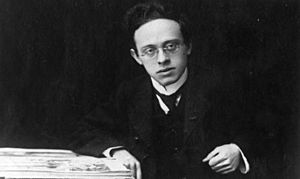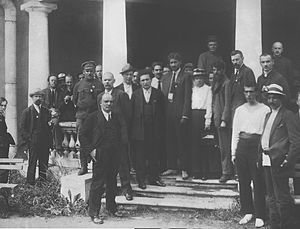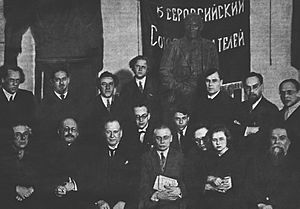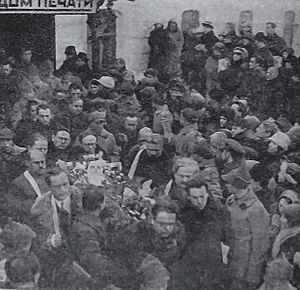Karl Radek facts for kids
Quick facts for kids
Karl Radek
|
|
|---|---|
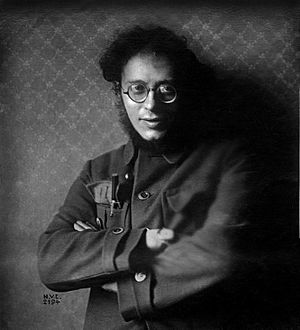
Radek in 1919
|
|
| Born |
Karol Sobelsohn
31 October 1885 |
| Died | 19 May 1939 (aged 53) |
| Nationality | Polish |
| Citizenship | Russian Empire, Soviet Union |
| Occupation | Revolutionary, writer, journalist, publicist, politician, theorist |
| Years active | 1904–1939 |
| Organization | Communist International |
| Known for | Marxist revolutionary activism |
| Political party | |
| Movement | Social democracy, communism, Bolshevik |
| Spouse(s) | Rosa Mavrikievna Radek, Larissa Mikhailovna Reissner |
| Children | Sofia Karlovna Radek |
Karl Berngardovich Radek (Russian: Карл Бернгардович Радек; October 31, 1885 – May 19, 1939) was a Russian revolutionary and writer. He was active in groups working for social change in Poland and Germany before World War I. After the Russian Revolution, he became a leader in the Communist International, a worldwide organization of communist parties, in the Soviet Union.
Radek was born into a Jewish family in Lemberg, which was then part of Austria-Hungary. He joined a group called the Social Democracy of the Kingdom of Poland and Lithuania. He also took part in the Russian Revolution of 1905 in Poland. Two years later, he had to leave for Germany. There, he worked as a journalist for the Social Democratic Party of Germany.
When World War I started, Radek moved to Switzerland. He became a close helper of Vladimir Lenin. After the February Revolution in Russia, Radek helped Lenin and other Russian revolutionaries return home. However, Radek himself was not allowed into Russia until after the October Revolution. He became a high-ranking official for foreign affairs. He also took part in the peace talks for the Treaty of Brest-Litovsk.
Radek helped start the Communist Party of Germany after the German Revolution began. He spent a year in prison for his part in the Spartacist uprising. After returning to Russia, Radek joined the Executive Committee of the Communist International. However, the revolution in Germany did not succeed. Also, Radek supported Leon Trotsky against Joseph Stalin. This led to him losing his power and being removed from the Party.
He later changed his mind and was allowed back into the Party. But during the Great Purge, a time when many people were arrested and punished in the Soviet Union, Radek was accused of serious crimes. He was found guilty at a major trial in Moscow in 1937. He was sentenced to 10 years of hard labor. He died in a prison camp in the Ural Mountains two years later.
Contents
Early Life and Beginnings
Karl Radek was born in Lemberg, Austria-Hungary. Today, this city is called Lviv and is in Ukraine. His birth name was Karol Sobelsohn. His family was Litvak, meaning they were Lithuanian Jewish. His father, Bernhard, worked at the post office and died when Karl was young.
Radek chose the name Radek from a character named Andrzej Radek. This character was in a book called Syzyfowe prace (which means 'The Labors of Sisyphus'). The book was written by Stefan Żeromski in 1897.
In 1904, Radek joined the Social Democracy of the Kingdom of Poland and Lithuania (SDKPiL). He was involved in the 1905 Revolution in Warsaw. There, he was in charge of the party's newspaper, Czerwony Sztandar.
Time in Germany
In 1907, Radek was arrested in Poland but managed to escape. He then moved to Leipzig, Germany. He joined the Social Democratic Party of Germany (SPD). He worked for the Party's newspaper, Leipziger Volkszeitung. In 1911, he moved to Bremen and worked for another newspaper, Bremer Bürgerzeitung.
In 1912, Radek was removed from the SDKPiL party. This happened after some older members brought up old accusations against him. However, many important figures like Leon Trotsky and Vladimir Lenin supported Radek.
World War I and the Russian Revolution
When World War I started, Radek moved to Switzerland. He worked to connect Lenin with other political groups in Germany. He also took part in the Zimmerwald Conference in 1915, which was a meeting of anti-war socialists.
During World War I, Radek had different ideas from Vladimir Lenin about the Easter Rising in Ireland in 1916. Lenin was very excited about the uprising, seeing it as a blow against the British Empire. Radek, however, thought the Irish movement was not strong enough. He believed the British government had already made the Irish farmers happy.
In 1917, Radek was on the famous sealed train that took Lenin and other Russian revolutionaries through Germany. This happened after the February Revolution in Russia. Radek was not allowed into Russia at that time. So, he went to Stockholm. There, he translated Russian documents into German and published them.
After the October Revolution and the start of the Russian Civil War, Radek arrived in Petrograd. He became a high-ranking official for foreign affairs. He was part of the Treaty of Brest-Litovsk peace talks. He also helped spread Bolshevik ideas among German soldiers and prisoners of war. During the treaty discussions, Radek was one of the people who wanted to continue fighting a revolutionary war.
Comintern and German Revolution
Radek was not recognized as an official representative of the Bolshevik government at first. He and other delegates tried to go to the German Congress of Soviets. They were turned back at the border. But Radek secretly crossed into Germany in December 1918. He arrived in Berlin and helped discuss and plan the start of the Communist Party of Germany (KPD).
Radek was arrested after the Spartacist uprising on February 12, 1919. He was held in Moabit Prison until January 1920. While he was in prison, Germany's view of the Bolsheviks changed. The idea of Germany, Russia, and Turkey forming an alliance against the Treaty of Versailles became popular. Because of this, Radek was allowed to have many visitors in his prison cell. These visitors included important people like Walther Rathenau and Enver Pasha.
When Radek returned to Russia, he became the Secretary of the Comintern. He was mainly in charge of issues related to Germany. He lost this job later because he disagreed with the Comintern's leaders. He supported the idea of a "united front" with other working-class groups. This idea later became a key strategy for the Comintern.
In 1923, Radek gave a speech called 'Leo Schlageter: The Wanderer into the Void'. In this speech, he praised a German officer named Leo Schlageter. Schlageter had been shot for trying to sabotage French troops. Radek wanted to explain why people like Schlageter were drawn to extreme right-wing groups. He tried to guide their national feelings toward supporting the working class and communists.
Radek was later blamed for the failure of the revolution in Germany. He was removed from his position in the Comintern.
Later Life and Trials
From 1923, Radek was part of the Left Opposition. This group disagreed with some of the main leaders of the Communist Party. He wrote an article praising Leon Trotsky shortly after Lenin became ill. Later that year, Radek was removed from the Party's Central Committee.
In 1925, Radek became the head of the new Moscow Sun Yat-sen University in Moscow. There, he gathered information from students about China. He also began to quietly question the official policies of the Comintern. However, his partner, Larisa Reisner, became very ill. This made Radek more open in criticizing Joseph Stalin. He especially argued against Stalin's idea of "Socialism in One Country." Radek was fired from his university job in May 1927.
Radek was removed from the Party in 1927. This happened after he helped organize a protest in Leningrad. In early 1928, Radek was sent to remote places in the Soviet Union. He was first sent to Tobolsk and then to Tomsk.
On July 10, 1929, Radek and other opposition members agreed to support Stalin. Radek was not liked by other opposition groups for this. He was allowed back into the Party in 1930. He was one of the few former opposition members who kept an important role in the Party. He led the International Information Bureau of the Russian Communist Party Central Committee. He also spoke about foreign literature at a writers' conference in 1934. In that speech, he criticized famous writers like Marcel Proust and James Joyce.
Later in his life, Radek believed the Soviet government should be close to Germany. In 1934, he met a German politician. Both of them were sad that their governments were becoming enemies. Radek even made a controversial comment, saying there were "some fine lads in the SA and SS." In 1936, he congratulated a German general when Germany took back the Rhineland.
Radek helped write the 1936 Soviet Constitution. But during the Great Purge of the 1930s, he was accused of serious crimes. After two and a half months of questioning, he confessed. This happened at a major trial in Moscow in 1937, known as the Second Moscow Trial. He was sentenced to 10 years of hard labor.
He was reportedly killed in a prison camp during a fight with another prisoner. An investigation after Stalin's death found that his murder was planned by a high-ranking secret police officer.
Radek was known for creating many Russian political jokes about Joseph Stalin. In 1988, under Mikhail Gorbachev, Radek was officially cleared of the charges against him. This process is called rehabilitation.
Selected Works
Karl Radek was a prolific writer. Here are some of his works that have been translated into English:
- "The Unity of the Working Class" (1909)
- "Marxism and the Problems of War" (1914)
- "The End of a Song" (1916)
- "The Development of Socialism from Science to Action" (1918)
- "Karl Liebknecht – At the Martyr’s Graveside" (1919)
- "Anti-Parliamentarism" (1920)
- "England and the East" (1920)
- "Is the Russian Revolution a Bourgeois Revolution?" (1921)
- "The Winding-Up of the Versailles Treaty" (1922)
- "Leon Trotsky, Organizer of Victory" (1923)
- "Leo Schlageter: The Wanderer into the Void" (1923)
- "Through Germany in the Sealed Coach" (1924)
- "Larisa Reisner" (1927)
- "Appeal for Trotsky" (1928)
- "Capitalist Slavery vs. Socialist Organisation of Labour" (1931)
- "The Birth of the First International" (1934)
- "Fifteen Years of the Communist International" (1934)
- "Contemporary World Literature and the Tasks of Proletarian Art" (1934)
- "Felix Dzerzhinski" (1935)
See also
 In Spanish: Karl Radek para niños
In Spanish: Karl Radek para niños


